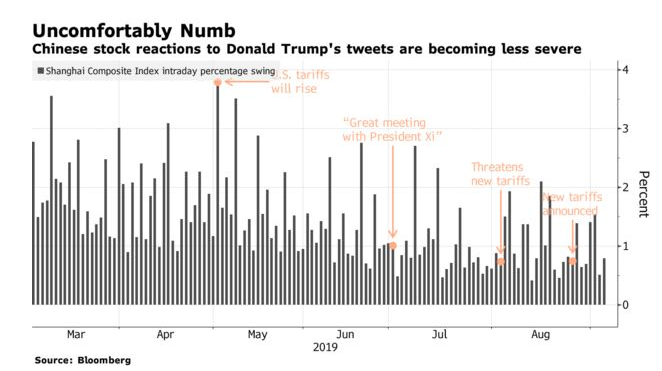President Trump’s use of Twitter to update the world on the ongoing trade war with China has put the social media platform in the spotlight globally – especially for equity traders, according to Bloomberg. As global markets and market participants react almost daily to Trump’s Twitter clues on how trade tensions are faring, there’s one part of the world that’s starting to grow numb to Trump’s social media posts: China.
There’s a couple of reasons that China is starting to ignore Trump’s tweets.
-
First, China doesn’t have easy access to them, since the social media service is banned there.
-
Additionally, the President’s tweets often occur outside of Chinese trading hours, causing them to have less of an effect on Chinese markets than U.S. markets.
-
Finally, the novelty simply seems to be wearing off.
Zhang Haidong, a fund manager at Jinkuang Investment Management in Shanghai said:
“It’s pointless following him too closely — he might say something today and it will be a whole different story tomorrow. Trading off his tweets alone would be too volatile.”
Trump has constantly moved markets with tweets on a vast array of topics, including China, North Korea, Amazon and Harley Davdison. He has downplayed the impact he has had on markets, however. After being asked about a market move lower last month, Trump responded: “…don’t tell me about 600 points.”
Trump’s tweets have moved Chinese markets in the past, but his influence there is waning. Back on May 6, two tweets from Trump sent global markets plunging, with the Shanghai Composite falling 5.6% – its biggest drop in more than 3 years. China’s own Twitter-like platform scrambled to remove posts about Trump’s comments. Volatility in Shanghai shot to 3 year highs.
But since then, the effect of Trump’s tweets have worn off. Bloomberg offered two more recent examples:
The Shanghai Composite Index rose 0.9% Wednesday as traders shrugged off Trump’s Tuesday tweet that said a trade deal with China would be much tougher if he’s re-elected. Declines on the gauge were also limited to 1.4% when Trump announced more tariffs in early August and later that month. The 50-day volatility measure is now near the lowest since February last year.
Fu Gang, a fund manager with Shanghai River East Asset Management Advisory Ltd. said: “People have very low expectations for a trade war resolution and valuations have fully priced that in.”
Trump’s tweets in China have to be shared in chat groups on places like WeChat, but the delay doesn’t seem to be a concern.
Lin Qi, fund manager at Lingze Capital said:
“These tweets have a very short-term effect on the market so second-hand sources like screenshots or news reports are enough — we’re in it for the mid-to-long term.”
Elle Shi, fund manager at Manulife Teda Fund Management Co. said:
“When the trade war first started, the market fluctuated as people reacted emotionally. Now everyone recognizes this will be a long-term negotiation process.”
Liang Jinxin, a strategist with Tianfeng Securities Co. concluded:
“I’m growing numb to all this. Just buy when the markets drop on the bad news, as you know that will be followed by good news after a while.”
Despite the ongoing trade war, China’s Shanghai Composite is up 19% this year. The Yuan, on the other hand, endured its worst month versus the dollar on record in August.
![]()
Zero Hedge’s mission is to widen the scope of financial, economic and political information available to the professional investing public, to skeptically examine and, where necessary, attack the flaccid institution that financial journalism has become, to liberate oppressed knowledge, to provide analysis uninhibited by political constraint and to facilitate information’s unending quest for freedom. Visit https://www.zerohedge.com


